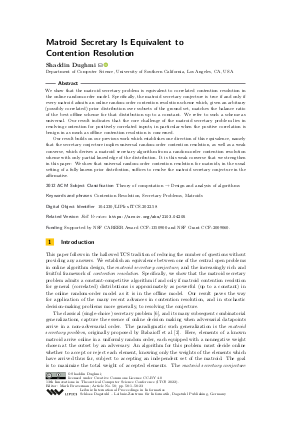Matroid Secretary Is Equivalent to Contention Resolution
Author
Shaddin Dughmi 
-
Part of:
Volume:
13th Innovations in Theoretical Computer Science Conference (ITCS 2022)
Part of: Series: Leibniz International Proceedings in Informatics (LIPIcs)
Part of: Conference: Innovations in Theoretical Computer Science Conference (ITCS) - License:
 Creative Commons Attribution 4.0 International license
Creative Commons Attribution 4.0 International license
- Publication Date: 2022-01-25
File

PDF
LIPIcs.ITCS.2022.58.pdf
- Filesize: 0.84 MB
- 23 pages
Document Identifiers
Related Versions
- Full Version https://arxiv.org/abs/2103.04205
Subject Classification
ACM Subject Classification
- Theory of computation → Design and analysis of algorithms
Keywords
- Contention Resolution
- Secretary Problems
- Matroids
Metrics
- Access Statistics
-
Total Accesses (updated on a weekly basis)
0Document
0Metadata
Abstract
We show that the matroid secretary problem is equivalent to correlated contention resolution in the online random-order model. Specifically, the matroid secretary conjecture is true if and only if every matroid admits an online random-order contention resolution scheme which, given an arbitrary (possibly correlated) prior distribution over subsets of the ground set, matches the balance ratio of the best offline scheme for that distribution up to a constant. We refer to such a scheme as universal. Our result indicates that the core challenge of the matroid secretary problem lies in resolving contention for positively correlated inputs, in particular when the positive correlation is benign in as much as offline contention resolution is concerned. Our result builds on our previous work which establishes one direction of this equivalence, namely that the secretary conjecture implies universal random-order contention resolution, as well as a weak converse, which derives a matroid secretary algorithm from a random-order contention resolution scheme with only partial knowledge of the distribution. It is this weak converse that we strengthen in this paper: We show that universal random-order contention resolution for matroids, in the usual setting of a fully known prior distribution, suffices to resolve the matroid secretary conjecture in the affirmative.
Cite As Get BibTex
Shaddin Dughmi. Matroid Secretary Is Equivalent to Contention Resolution. In 13th Innovations in Theoretical Computer Science Conference (ITCS 2022). Leibniz International Proceedings in Informatics (LIPIcs), Volume 215, pp. 58:1-58:23, Schloss Dagstuhl – Leibniz-Zentrum für Informatik (2022)
https://doi.org/10.4230/LIPIcs.ITCS.2022.58
BibTex
@InProceedings{dughmi:LIPIcs.ITCS.2022.58,
author = {Dughmi, Shaddin},
title = {{Matroid Secretary Is Equivalent to Contention Resolution}},
booktitle = {13th Innovations in Theoretical Computer Science Conference (ITCS 2022)},
pages = {58:1--58:23},
series = {Leibniz International Proceedings in Informatics (LIPIcs)},
ISBN = {978-3-95977-217-4},
ISSN = {1868-8969},
year = {2022},
volume = {215},
editor = {Braverman, Mark},
publisher = {Schloss Dagstuhl -- Leibniz-Zentrum f{\"u}r Informatik},
address = {Dagstuhl, Germany},
URL = {https://drops.dagstuhl.de/entities/document/10.4230/LIPIcs.ITCS.2022.58},
URN = {urn:nbn:de:0030-drops-156540},
doi = {10.4230/LIPIcs.ITCS.2022.58},
annote = {Keywords: Contention Resolution, Secretary Problems, Matroids}
}
Author Details
Funding
Supported by NSF CAREER Award CCF-1350900 and NSF Grant CCF-2009060.
References
-
Marek Adamczyk and Michał Włodarczyk. Random order contention resolution schemes. In 2018 IEEE 59th Annual Symposium on Foundations of Computer Science (FOCS), pages 790-801. IEEE, 2018.

-
Moshe Babaioff, Nicole Immorlica, and Robert Kleinberg. Matroids, secretary problems, and online mechanisms. In Proceedings of the eighteenth annual ACM-SIAM symposium on Discrete algorithms, pages 434-443. Society for Industrial and Applied Mathematics, 2007.

-
Curtis Bechtel and Shaddin Dughmi. Delegated stochastic probing. In Proceedings of the Conference on Innovations in Theoretical Computer Science (ITCS), 2021.

-
Chandra Chekuri, Jan Vondrák, and Rico Zenklusen. Submodular function maximization via the multilinear relaxation and contention resolution schemes. SIAM Journal on Computing, 43(6):1831-1879, 2014.

-
Shaddin Dughmi. The outer limits of contention resolution on matroids and connections to the secretary problem. In 47th International Colloquium on Automata, Languages, and Programming (ICALP 2020). Schloss Dagstuhl-Leibniz-Zentrum für Informatik, 2020.

-
Evgenii Borisovich Dynkin. The optimum choice of the instant for stopping a markov process. Soviet Mathematics, 4:627-629, 1963.

-
Soheil Ehsani, MohammadTaghi Hajiaghayi, Thomas Kesselheim, and Sahil Singla. Prophet secretary for combinatorial auctions and matroids. In Proceedings of the Twenty-Ninth Annual ACM-SIAM Symposium on Discrete Algorithms, pages 700-714. SIAM, 2018.

-
Hossein Esfandiari, MohammadTaghi Hajiaghayi, Vahid Liaghat, and Morteza Monemizadeh. Prophet secretary. SIAM Journal on Discrete Mathematics, 31(3):1685-1701, 2017.

-
Moran Feldman, Ola Svensson, and Rico Zenklusen. Online contention resolution schemes. In Proceedings of the twenty-seventh annual ACM-SIAM symposium on Discrete algorithms, pages 1014-1033. Society for Industrial and Applied Mathematics, 2016.

-
Shayan Oveis Gharan and Jan Vondrák. On variants of the matroid secretary problem. Algorithmica, 67(4):472-497, 2013.

-
Martin Hoefer and Bojana Kodric. Combinatorial secretary problems with ordinal information. In 44th International Colloquium on Automata, Languages, and Programming (ICALP 2017). Schloss Dagstuhl-Leibniz-Zentrum fuer Informatik, 2017.

-
Wassily Hoeffding. Probability inequalities for sums of bounded random variables. In The Collected Works of Wassily Hoeffding, pages 409-426. Springer, 1994.

-
David R Karger. Random sampling and greedy sparsification for matroid optimization problems. Mathematical Programming, 82(1-2):41-81, 1998.

-
Robert Kleinberg and Seth Matthew Weinberg. Matroid prophet inequalities. In Proceedings of the forty-fourth annual ACM symposium on Theory of computing, pages 123-136. ACM, 2012.

-
Euiwoong Lee and Sahil Singla. Optimal online contention resolution schemes via ex-ante prophet inequalities. In 26th Annual European Symposium on Algorithms (ESA 2018). Schloss Dagstuhl-Leibniz-Zentrum fuer Informatik, 2018.

-
J. G. Oxley. Matroid Theory. Oxford University Press, 1992.

-
José A Soto, Abner Turkieltaub, and Victor Verdugo. Strong algorithms for the ordinal matroid secretary problem. Mathematics of Operations Research, 2021.

-
Dominic JA Welsh. Matroid theory. Courier Corporation, 2010.

